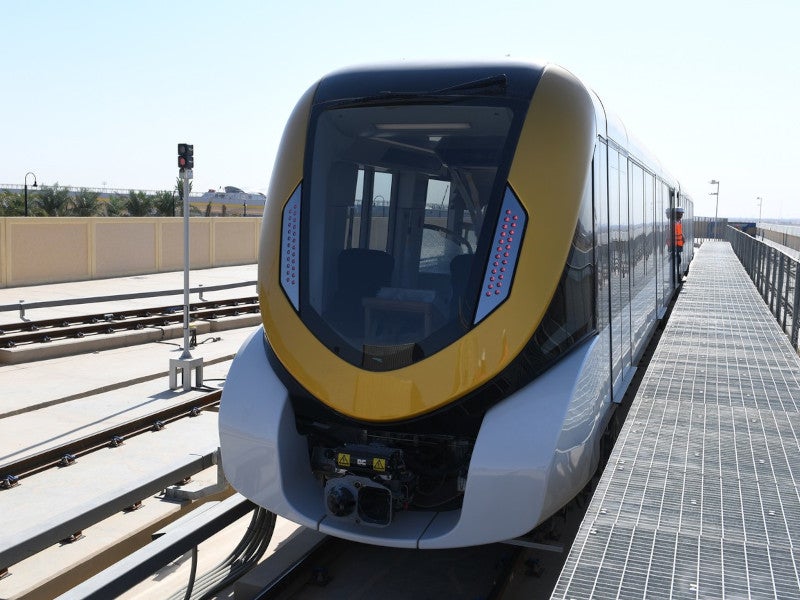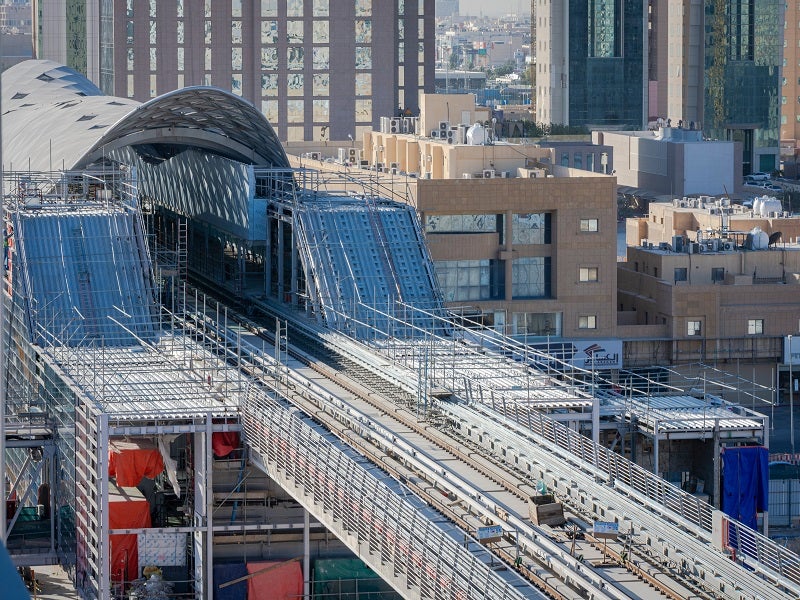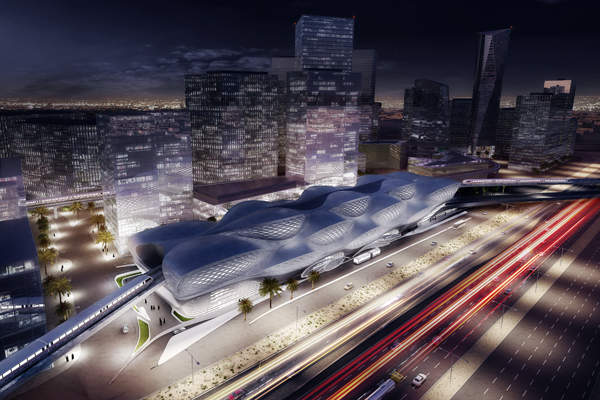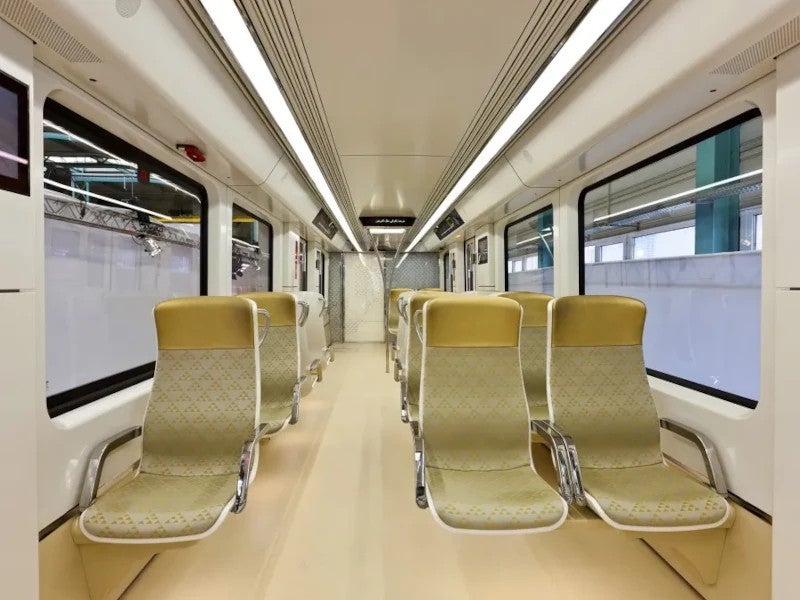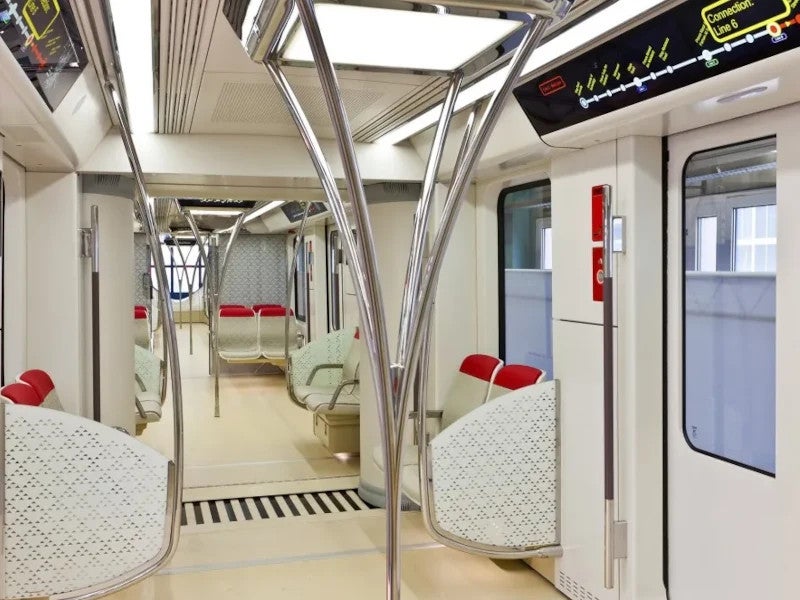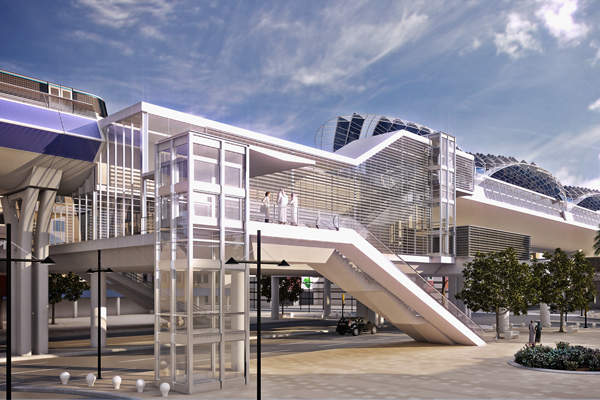The Riyadh Metro is a rapid transit system under construction in Riyadh, Saudi Arabia. It is a part of the Riyadh Public Transport Project (RPTP), which will be the largest public transport project.
The RPTP comprises the construction of a metro network, a bus system and other transport services in the capital city.
The metro project aims to transform Riyadh’s public transportation infrastructure and provide a more efficient and sustainable means of commuting for residents and visitors alike.
Arriyadh Development Authority (ADA) is the owner and operator of Riyadh Metro.
Riyadh had a population of 5.7 million in 2012, which is predicted to increase to eight million by 2030. The new metro system is expected to fulfil the demands of the growing population, reduce traffic congestion and improve air quality.
Construction of the Riyadh Metro project began in April 2014, while tunnelling work on Line 1 started in July 2015. Test runs on the metro commenced in 2018.
The project is expected to start operations by the end of 2023 or during early 2024.
Riyadh Metro project history
The RPTP’s plan was developed by the High Commission for the Development of Arriyadh. The plan received approval from the Riyadh Council of Ministers in April 2012.
The RPTP project also includes the construction of a bus network. The 85km three-line Bus Rapid Transport (BRT) network will connect major locations in Riyadh. All metro stations will be integrated with the bus network.
Lines and routes of the Saudi Arabian transport project
The Riyadh Metro project will be 176km long with six lines and 85 stations, including underground, elevated and at-grade sections.
Line 1, the Blue Line, will run from Olaya Street to Al Hayer Road. It will be 38km long and include 22 stations and four transfer stations connecting to other metro lines.
The Red Line, or Line 2, will connect King Abdullah Road to the King Fahd Stadium. It will be 25.3km long and have 13 stations along with three transfer stations.
The longest line of the metro will be the 40.7km-long Line 3, or Orange Line, which will run from Madina Al Munawra to Rahman Al Awal Road.
Line 4, the 29km Yellow Line, will run from the King Khaled International Airport to the new King Abdullah Financial District (KAFD) and include eight stations.
Line 5, the Green Line, will be 13km long and start from King Abdul Aziz Road. It will include 11 stations and two transfer stations.
Line 6, the Purple Line, will feature six stations and will be 21km long, mostly above ground. It will start at KAFD and end at Prince Saad Ibn Abdulrahman Al Awal Road.
Major stations of Riyadh’s public transport project
The project will include four major stations, namely the Olaya Metro Station, the Downtown Metro Station (Qasr Al Hokm), KAFD Metro Station, and the Western Station.
The Olaya Metro Station will be located at the intersection of Lines 1 and 2 and will feature a public plaza, a large entrance hall, and an open concourse. The station will have a gross floor area of 68.85m² and a gross volume of 387m³. ADA is expected to invest $20m in the station.
The Downtown station is being constructed between Al Madinah Al Munnawarah Street and King Faisal Street. The station will act as a transport hub for Lines 1 and 3.
The KAFD Metro Station will be located to the east of the Northern Ring Road and slightly west of the King Fahad Road. It will serve Lines 1, 4 and 6.
Spread across 110,000m², the Western Station is part of Line 3. The project site for the station is in the Dhahrat Al Badi’ah quarter, in the southwestern part of Riyadh.
Features of Riyadh Metro
The Riyadh Metro project will not only improve transportation but also aims to enhance the quality of life for residents.
The project includes the development of pedestrian-friendly areas, cycling paths, and landscaping around the stations, promoting a more sustainable and liveable urban environment.
The metro system is designed to be accessible for people with disabilities, ensuring inclusivity and equal access to public transportation.
Intelligent fare system
The Riyadh Metro will employ an intelligent fare system that enables seamless ticketing and fare collection.
Passengers will be able to access the transportation system using a smart card, which can be validated by placing it near the card reader. The contactless system uses near-field communication (NFC) technology.
Sustainable features of Riyadh metro
The Riyadh Metro is expected to reduce congestion and pollution while offering people a sustainable and fast public transport choice.
Renewable energy will be used to provide power for all the metro stations along the six lines.
The KAFD Station, Western Station, and Downtown Station are targeting Leadership in Energy and Environmental Design (LEED) certification.
The project will also support long-term sustainable development throughout the city.
The metro system will leverage Alstom’s HESOP (Harmonic Energy Saver) solution, which is a train braking, energy-recovery system.
The HESOP technology recovers braking energy from trains. The recovered electrical energy can be fed into the public grid or used to power electro-mechanical equipment at stations. The system is expected to avoid about three million kilograms of carbon emissions and deliver power savings of 6.6 million kilowatts a year.
Contractors involved in the Riyadh Metro project
Gerber Architekten, an international architect based in Germany, designed the Olaya Metro Station. Norway-based architectural company Snohetta, together with One Works & Crew designed the Downtown station.
One Works provided architectural design, cost consultancy, civil engineering, and structural engineering services for the Downtown station and the Western Station. In addition to these services, the company also provided infrastructure design for the Western Station.
One Works was also selected to provide the entire integrated detailed design and structural design for the new Park + Ride facilities, as part of Riyadh Metro’s Line 3. The facilities will include four car parks with more than 2,300 parking spaces.
Zaha Hadid Architects was selected to design and build the KAFD Metro Station. Omrania, an international architecture and engineering consultancy based in Saudi Arabia, was contracted to provide the design for the architecture, interiors, and landscape of the Western Station.
ADA awarded the design and construction contract of the Riyadh metro to three consortiums BACS, Arriyadh New Mobility (ANM) and FAST, in August 2013.
The BACS consortium includes Bechtel, Almabani General Contractors, Consolidated Contractors Company, Siemens and AECOM.
The consortium is led by Bechtel and is responsible for designing and constructing Lines 1 and 2 under a $9.4bn contract.
It is also responsible for the train cars, signalling, electrification and integration of the lines to the metro network.
ANM’s $5.2bn contract includes the construction of Line 3 of the metro, Qasr Al Hokom station and Western Station.
The ANM consortium includes Ansaldo STS, Salini-Impregilo, Larsen & Toubro, Nesma, Bombardier, Hyder Consulting, IDOM and Worley Parsons Arabia.
Larsen & Toubro and Nesma are providing civil works services, while Bombardier is responsible for the procurement of the vehicles.
Ansaldo STS is responsible for technology support services for Line 3. The company’s contractual scope also includes signalling support services, automation train control (ATC) and communication-based train control (CBTC), as well as other telecommunication services.
The contract value for Ansaldo STS is $680m with an option to add $249m for maintenance of Line 3.
Led by FCC Construction, FAST received a $7.9bn contract to construct and design Lines 4, 5 and 6 of the metro.
The consortium includes FCC Construction, Samsung C&T, Alstom Transport, Strukton Civiel, Freyssinet Saudi Arabia, Atkins, Tecnica Y Proyectos and Setec.
The contract includes construction of 64.6km of rail track, 29.8km of viaducts, 26.6km of underground track and 8.2km of overground track.
Underground tunnels are being built with the help of three tunnel boring machines (TBM). The tunnels have a 10m diameter to facilitate the three metro lines.
The $7.9bn contract is financed through the Public Investment Fund of the Government of Saudi Arabia.
Alstom is providing its automated driverless metro system for the metro project under a $1.5bn (€1.2bn) contract.
Herrenknecht supplied six tunnel boring machines for the construction of Lines 1 and 5.
In August 2013, a joint venture of WSP (formerly Louis Berger) and Hill International was awarded a $265m contract to offer project and construction management services for Lines 4, 5 and 6 and associated stations and tunnels. A joint venture of Egis, Parsons and Systra received a €425m ($563m) project management contract for Lines 1, 2 and 3.
L&T Construction won a $161.37m contract to design and construct ballastless tracks for Lines 1 and 2. Indra received a €266m ($320m) ticketing and access control technology contract for the Riyadh metro project in January 2015.
Ansaldo STS was awarded a $2.9bn contract by ADA in September 2018 to provide operation and maintenance services for a period of 12 years for Lines 3, 4, 5 and 6.
The FCC Industrial Division was awarded a $332m contract to provide electromechanical installation of services for the Green and Purple Lines of the Riyadh metro project in July 2016. The contract included lighting, ventilation, fire-fighting and air conditioning systems on the two metro lines.
A joint venture of Capital Metro Company (CAMCO), RATP Dev (a subsidiary of RATP Group) and Saudi Public Transport Company (SAPTCO) was awarded a 12-year contract by ADA to provide operations and maintenance services for Lines 1 and 2 in September 2018. The contract includes the delivery of security, passenger assistance, and facility management services.
Terrasol, Techture, Eversendai Engineering Saudi, Trimble Solutions, Perkins&Will, Ayesa, Dogus Insaat Ve Ticaret, Salcef Group, Rhomberg Sersa Rail Group, ByrneLooby, 3TI Progetti, BDP, Pedelta, Prointec, Systech International, AVK, Dextra Group, Otis Saudi Arabia and CCL are some of the other suppliers and contractors involved in the project.
Rolling stock for the metro system in Riyadh
Alstom provided 69 metro trains for the Riyadh metro project, with the last trainset shipped in February 2019. It also supplied its Urbalis signalling system and implemented the HESOP system, and Appitrack, a new technology to install tracks faster.
The metro trains will be operated in automated mode. Each train will have two cars. The driverless metro train will be 36m long and 2.71m wide.
Bombardier Transportation agreed to build 47 INNOVIA Metro 300 trains sets in Mexico. The company signed an agreement with DHL to ship the train sets to Riyadh. The two-car, driverless trains will be equipped with Mitrac Propulsion technology and provide a comfortable and convenient riding experience for passengers.
Siemens agreed to provide 67 Inspiro-type metro vehicles for Lines 1 and 2 with two to four cars each, suitable for operation in adverse climatic conditions.

